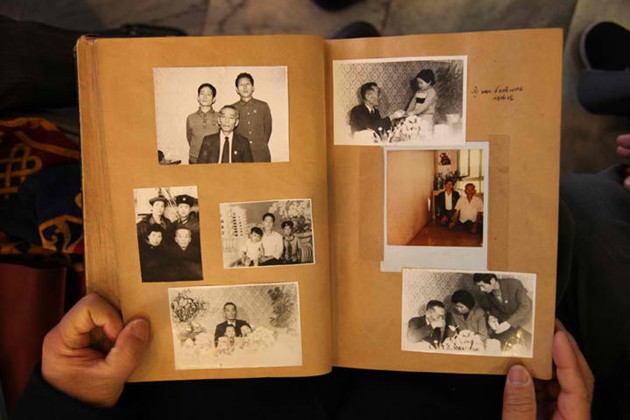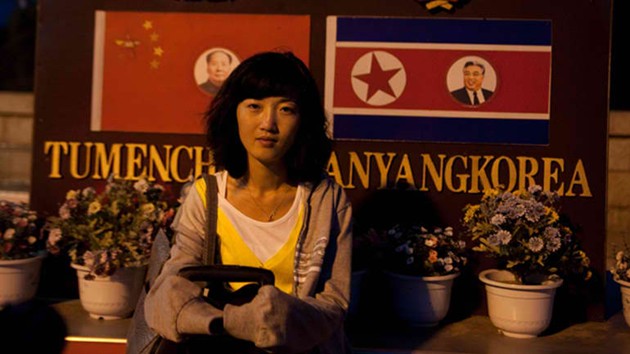
SEEKING HAVEN (Hein S. Seok)
Seeking Haven, part of KAFFNY’s opening night program, is one of several films in the festival that convey the pain of Korea’s national division in intimately human terms. This brief (51 minute) yet powerful documentary follows Young-soon, a North Korean defector who fled with her sister Mi-hee to a safe house in China. Unable to afford the smugglers’ fees that would have allowed them both to travel to South Korea, Young-soon alone made the treacherous journey (documented vividly here, often using hidden cameras) from China, though Laos and Thailand (where North Koreans are given political asylum, without fear of repatriation), and eventually to freedom in South Korea.
But this freedom comes with a steep price: Young-soon is separated from her family. Their safe house in China is raided, and Mi-hee is sent back to North Korea, where she is placed in a camp for political prisoners; worse, Mi-hee becomes fatally ill, subsequently languishing in a prison hospital. Young-soon decides to take the risky step of returning to China, where she attempts to broker her sister’s release from prison with bribe money, as well as smuggle Mi-hee and their father out of North Korea.
Seeking Haven tells an intensely emotional story, and gives a full sense of the dangers and sacrifices necessary in order to escape the North Korean regime. This is often placed in the hands of often unscrupulous smugglers, who in some cases prove to be more concerned with covering their own asses and squeezing whatever money they can out of transactions than with the desperate people who depend upon them to gain freedom. As is often the case with politics and ideology, human lives are tragically caught in the middle, and as Youngsoon finds, it often becomes necessary to wipe one’s slate clean and begin a new life alone.
(October 24, 8pm)
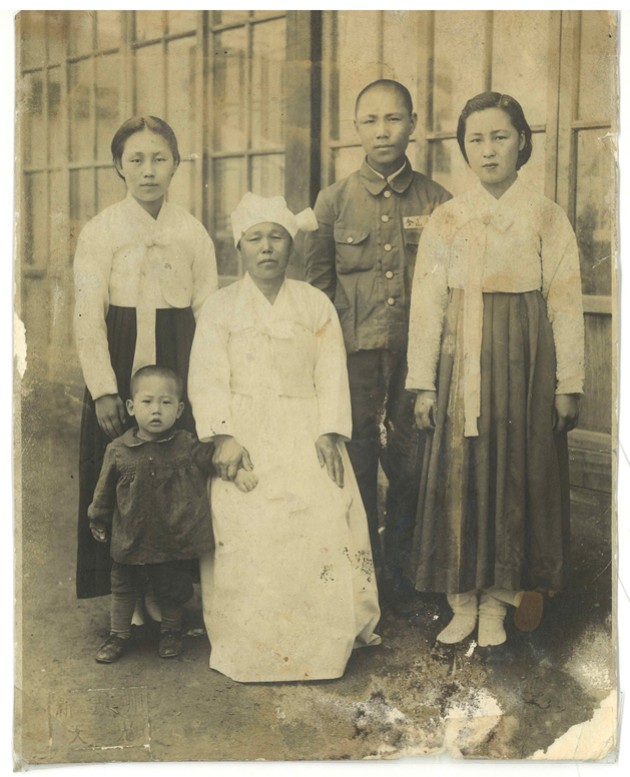
MEMORY OF FORGOTTEN WAR (Deann Borshay Liem and Ramsey Liem)
This 37-minute documentary short is based on Ramsey Liem’s multimedia exhibition “Still Present Pasts: Korean Americans and the Forgotten War,” which featured oral histories of Korean War survivors. The film weaves the stories of four of these survivors who emigrated to the U.S. with analysis by two scholars – Bruce Cumings and Ji-Yeon Yuh – who place these stories in a broader historical context. The result is a valuable primer on the Korean War, known as “the forgotten war,” one that presents facts that will be surprising to many.
For example, the conflict between North and South Korea began well before the official start of the war, not too long after Korea’s 1945 liberation from Japanese colonialism as a result of the end of World War II. As early as 1948, there were already two separate and hostile states that were warring with one another over very vicious ideological divisions. Also, U.S. bombing during the conflict involved the first major use of napalm, more associated in the popular imagination with the Vietnam War.
The stories told in Memory of Forgotten War powerfully bring home the fact that the impact of the Korean War on separated families in Korea, as well as those who emigrated to the U.S., remains strongly felt by all those touched by this conflict. As long as there remains no official end to this war, the pain and the devastation of the war will continue.
(October 24, 8pm)
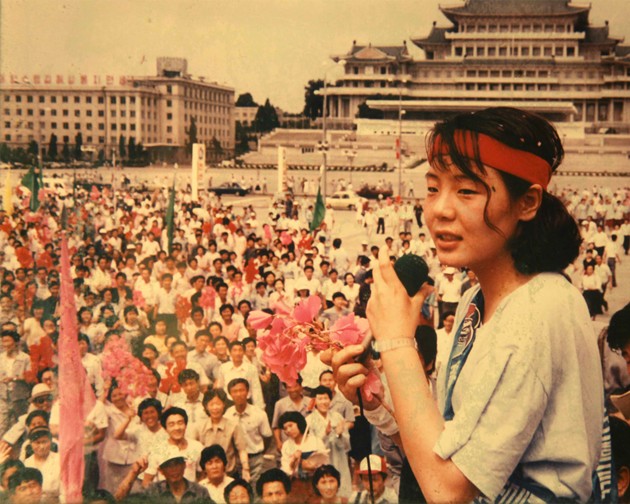
THE GIRL FROM THE SOUTH (Jose Luis Garcia)
The clear standout of the festival films available for preview, The Girl from the South approaches the subject of Korea’s national division from an unusual perspective. Garcia in 1989 found himself as part of the Argentine delegation at the World Youth and Students Festival, a Soviet-sponsored convention for left-wing activists held in Pyongyang. Garcia documented his experiences with a borrowed VHS camera, and the initial sections of this film capture the fascinating party atmosphere of this festival, in which Pyongyang represented itself as a welcoming, affluent host, a show which in subsequent years was proven a charade.
Garcia became fascinated by the presence of Lim Suk-yung, a young woman activist from South Korea who made quite an impression on him and just about everyone who saw her. Lim was a passionate and charismatic advocate for Korean unification; after the festival, instead of sneaking back into South Korea, she boldly walked across the militarized border, where she was promptly arrested on the other side.
In subsequent years, Garcia wondered what happened to her, and found precious little news of her after these events. With the help of a Korean friend living in Argentina, Garcia manages to track Lim down, where she is now a professor of media studies. In contrast to the old days, Lim proves to be an elusive film interview subject, a cantankerous and prickly woman embittered by media scrutiny and personal tragedy who delays and resists Garcia’s attempts at a formal sit-down. The Girl from the South captures, with often painfully awkward episodes, what happens when youthful idealism congeals into defeated cynicism.
(October 26, 6:45pm)
LETTERS FROM PYONGYANG (Jason Lee)
The 28-minute short documentary Letters from Pyongyang follows Korean-Canadian filmmaker Jason Lee’s travels to Pyongyang with his father to track down long-lost relatives whose letters abruptly stopped coming to their home in Montreal. When in North Korea, the minders assigned to them take them on a tour of official tourist attractions, but they are never allowed to visit people’s actual homes – Jason and his father meet with relatives in a hotel rather than at anyone’s house.
While we aren’t given any new insights here, the film is well shot and designed, and the looming North Korean state architecture provides an ironic counterpoint to the painful histories that are revealed in their midst.
(Included in the Forgotten War Shorts program, October 26, 2:30pm)
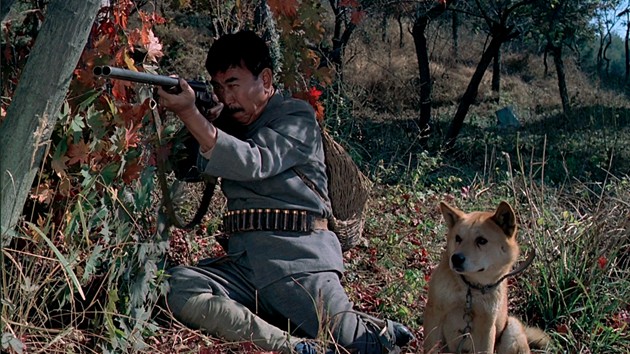
THE OTHER SIDE OF THE MOUNTAIN (In Hak-jang)
KAFFNY’s closing night film The Other Side of the Mountain is an unprecedented film production collaboration between the U.S. and North Korea. First-time producer and screenwriter Joon Bai – himself a Korean War refugee now in his 70s – spent six years making this film with an entirely North Korean director and crew. It marks the first film made in North Korea with sync sound, and after the difficult film shoot, post-production was done in China due to the DPRK’s meager resources.
Mostly free of the overt propaganda that marks most North Korean cinema (though the film’s sympathies clearly lie on that side of the border), The Other Side of the Mountain tells the story – mostly in flashback with a present day frame – of a North Korean nurse and a South Korean soldier who meet during the Korean War. Though conflict arises after the soldier, who posed as a North Korean villager after deserting the army, finally reveals himself to the nurse, a deep love grows between the two. This is undimmed through many years of national separation that make it impossible for them to see one another. This is melodrama with epic sweep, impressively effective despite the limited circumstances of the film’s production.
The filmmaking style is quite peculiarly old-fashioned – this could easily have been made at the time of the film’s setting – and retains the unique flavor of other North Korean films. But it all is quite emotionally effective, and obviously made as a labor of love, a feeling reinforced at the conclusion, when the cast and crew sing the film’s theme song, scored – as is the rest of the film – by a North Korean orchestra.
(October 26, 9pm)











